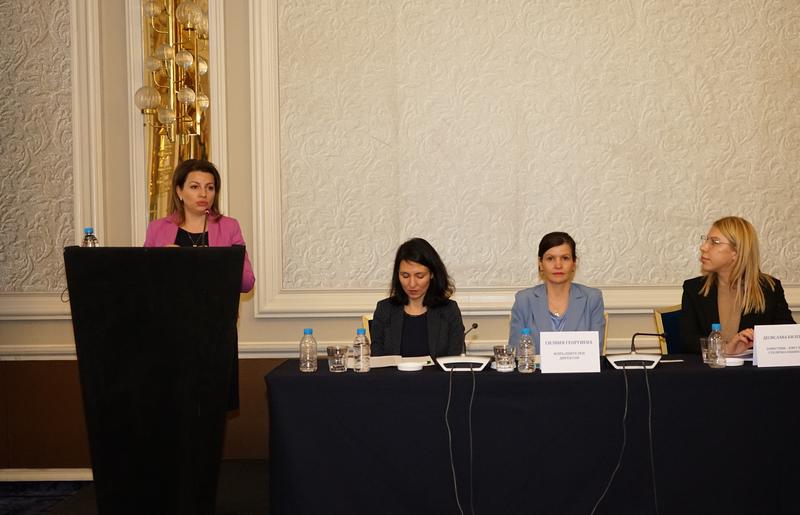Deputy Minister Reneta Koleva presented to municipalities the priorities and financial instruments for climate change mitigation and adaptation
05 Apr, 2023 | 12:53The efforts by municipalities to implement pilot and innovative approaches to deal with the challenges that are currently on the agenda in respect to climate really show that with will, knowledge, and experience, sustainable results can be achieved. With this statement, the Deputy Minister of Environment and Water Reneta Koleva addressed the participants in training on the topic “Integration of climate mitigation and adaptation measures”, organized by the National Association of Municipalities in the Republic of Bulgaria. The event was held with the assistance of the European Commission’s Policy Support Mechanism, which aims to support local and regional authorities to develop and implement climate change adaptation strategies.
Deputy Minister Koleva presented the strategic priorities and policies in this area and the funds that would support local authorities’ adaptation actions.
“We can all see that climate change is not just a future threat – it's happening now. To be better prepared for the consequences for human health, nature, and the economy, we recognize that our efforts to reduce emissions must be proportional to the efforts to adapt to climate impacts and build resilience for the future,” Koleva said, clarifying that climate change policy is a key priority for the Ministry of Environment and Water, whose strategic goals and opportunities are identified in its National Climate Change Adaptation Strategy and Action Plan. The aim is to reduce the country’s vulnerability to the effects of climate change and improve the adaptive capacity of environmental, social, and economic systems.
In the National Strategy for Adaptation to Climate Change, nature-based solutions are recognized as an important part of the urban sector. One of the main specific opportunities for adaptation is the development of the urban green system to reduce extremely high temperatures, strong winds, and air pollution - Reneta Koleva pointed out. Urban systems can be an example of paving the way to a low-carbon society realized with various nature-based solutions. Cities will need to deploy nature-based solutions in their development as an alternative for long-term economic growth. Adaptation measures should be more closely integrated with mitigation measures, disaster management, and other sectoral plans. In order for climate change adaptation to be sustainable and widely applicable, it must be transposed into sectoral and cross-sectoral policies and legislation and embedded in development plans at the local level, added the Deputy Minister.
In front of the participants, Reneta Koleva gave an overview of the possibilities for municipalities and regional administrations to finance actions for adaptation to climate change. She pointed out that at the European level during this program period (2021-2027) funding for climate action is scheduled to reach 30% of the total budget of Structural and Cohesion Funds, and under the Recovery and Resilience Mechanism this percentage is 37. More and more of these funds are allocated to support adaptation activities, but this must be done by integrating the measures into sectoral programs and policies (for agriculture, forestry, building stock, infrastructure, flood prevention, etc.) - at national, regional, and local levels.
The total budget under the Program Environment 2021-2027 under the “Risk and climate change” priority is 441 million BGN (funds from the European Regional Development Fund and the national budget). In selecting investment projects to be funded, priority will be given to the implementation of environmentally friendly (“green”) flood and drought risk prevention and management measures identified in Flood Risk Management Plans (FRMPs) for areas of significant potential risk from floods, whereby the total amount of the funds directed to municipalities and regional administrations as beneficiaries is approximately 92 million BGN. Another approximately 49 million BGN will be directed to measures for monitoring, prevention and protection from landslides, collapses, erosions, and abrasions. The measures will be implemented through the Integrated Territorial Investments approach.
Reneta Koleva also informed that 15 grant contracts under the “Environmental Protection and Climate Change” Program of the Norwegian Financial Mechanism are being executed, with each of the beneficiary municipalities contributing to the implementation of the climate adaptation measures from the plan, such as installation of photovoltaic power plants for own needs of municipal kindergartens, schools, and public buildings; delivery of charging stations for electric cars; solar hot water systems for the needs of municipal kindergartens; pilot introduction of home composting of biodegradable waste in households, etc. The LIFE program up until 2027 will provide almost 2 billion euros for climate action, whereby a third of these will fund adaptation measures, added Deputy Minister Koleva.
She also pointed out that the latest opportunity to support adaptation action is provided by the Horizon Europe Programme, where a dedicated EU Climate Change Adaptation Mission was established. The charter for joining the Mission has been signed by over 300 municipalities and regions from 25 EU member states and several associated countries. “They were announced a few weeks ago and I am pleasantly surprised to see that 13 municipalities from 11 regions from Bulgaria have joined, many of them from less developed regions,” announced Reneta Koleva, adding that “until October last year there were only two Bulgarian municipalities - Burgas and Stambolovo, but now the members of the Mission from Bulgaria cover over half a million residents from 424 settlements. Within the framework of the Mission, by 2030 at least 150 regions will be supported in their efforts to achieve resilience to climate change. The implementation of demonstration models for adaptation in 75 of the most vulnerable regions will be supported. I hope some of them are from Bulgaria!”
“The MOEW will make every effort to support municipalities in planning adaptation measures through the available financial mechanisms, but the driving force in their implementation will be local authorities, together with local communities, initiative groups, and non-governmental organizations, who know the regional peculiarities best,” Deputy Minister Reneta Koleva said in conclusion.
